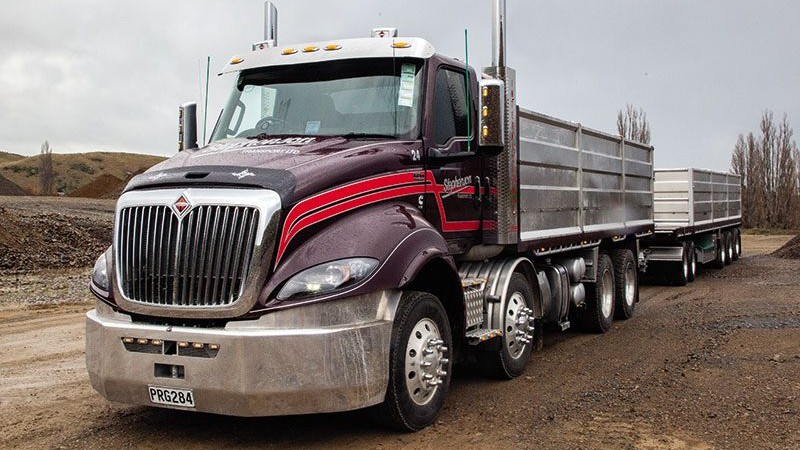
The ProStar proved to be a good truck for Intertruck. Reliability was right up there, tare weight right down. They were simple, get-in-and-drive machines. Not much to do but offer more of the same with the enhanced RH, then?
“The RH is the next phase in the ProStar line,” says Hugh Green, sales manager Intertruck Distributors.
Movements to transition to RH began in late 2020/ early 2021. That was about the time the Aussies decided they’d ditch the model completely, meaning if Intertruck wanted to keep offering a bonneted solution, it would have to follow much the same path it did with the 9800 and 9870 and take the bull by the horns. And in the middle of it all, the company was shifting into its new facility, which put back the programme by a further six months or so.
“At this stage, we still have four or five ProStar instrument panels (IP) left to build out, and then we’re completely into the new one,” comments Intertruck New Zealand managing director Comer Board. “The Stephenson truck can be seen as a ‘Mk.1’ RH.”
OK, let’s back up a bit. Engineering a truck, whether from the ground up or by evolution, isn’t a simple undertaking. The ProStar’s fundamentals were a good base, though, and most of the improvements are to the bits you can’t see.
“The right-hand drive ProStar was a model for Australia and New Zealand. When the decision was made between Navistar and IVECO to pull out of the Australian market, part of the reason was the serious investment to go from the old ProStar instrument panel to the new RH. The ProStar runs on a 250 baud rate data platform, while the new version in the US runs on a 500 baud rate. It meant that someone had to make a huge investment, so Intertruck decided we’d take it upon ourselves,” Comer explains.
A 500 baud rate means a much faster data supply to the cab. Navistar is one of the only OEMs in the North American market that runs multiplex wiring. “We’ve had some clever chaps from Navistar come over who now are part of our management team,” Comer explains.
“And there’s a huge number of things people would never recognise between a left- and right-hand drive. Part of the agreement was Navistar would take over all the feature codes to make it right-hand drive – about 500 to 600 hours of engineering time. That was excluding the IP. We had to forge ahead and do the right- hand drive IP. It’s probably the biggest investment we’ve ever made.”
As such, Intertruck has taken a staged approach, and the first stage is reaching completion now. “We felt we could make some improvements from left- to right-hand drive, but for us to kick the programme off, it was easier to just flip over the cab design. Stage two will kick off next year and we may make more refinements – positioning things a bit better, smoother lines; make it a bit more attractive for the Kiwi operator,” Comer says.
Hugh adds: “I think some of our guys had hair when they started! But they love a challenge – there’s never been a time when they threw their hands up and said, ‘We can’t do it.’ And that’s something a lot of our customers love – the Kiwi ingenuity and being able to refine it for this market.”
The RH in its first stage of development – the Mk.1 as Comer put it – features the new single-arm RH mirrors, the new single-window door trims, and some other small RH features. While there have been few major mechanical changes, Comer says, drivers report a different experience to the ProStar. “They sit on the road better, ride better.”
For now, the Euro-5 Cummins remains the powertrain of choice, but there are plans to move to Euro-6c. “Euro-5 will remain for a bit longer. We’ve had conversations with Cummins, and we’ll do Euro-6 as a local installation as we did with Euro-4 and Euro-5. A vehicle is earmarked for build next year, and it will be about a six- month project,” Comer says.
As with the ProStar, the Bendix Wingman Fusion suite of electronic driver assistance and collision mitigation systems remains on offer. It’s approved for the 6×4 and short-wheelbase 8×4 tractor unit and bulk tipper.
Hugh sums up: “It’s the same as our cabover product… constant refinement of the truck over time to keep pace with the market and give the customers what they’re asking for.”
Read more
A Kiwi OEM
0 Comments2 Minutes
Like father like son
0 Comments8 Minutes





